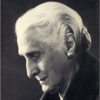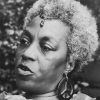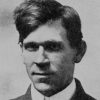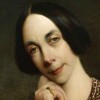His mother was the high priestess. It was her right to go first. To begin the killing, and so she threw herself at him.
He tore the headband from his head so that she would recognize him — oh, poor Agave — to stop her from killing him.
He touched her face and said:
It’s me, mother.
It’s me. Your son, it’s Pentheus.
You had me in Echion’s house.
Mercy, mother, please. I know I messed up, please, please don’t kill me, don’t kill your son —[πρώτη δὲ μήτηρ ἦρξεν ἱερέα φόνου
καὶ προσπίτνει νιν: ὃ δὲ μίτραν κόμης ἄπο
ἔρριψεν, ὥς νιν γνωρίσασα μὴ κτάνοι
τλήμων Ἀγαύη, καὶ λέγει, παρηίδος
ψαύων: Ἐγώ τοι, μῆτερ, εἰμί, παῖς σέθεν
Πενθεύς, ὃν ἔτεκες ἐν δόμοις Ἐχίονος:
οἴκτιρε δ᾽ ὦ μῆτέρ με, μηδὲ ταῖς ἐμαῖς
ἁμαρτίαισι παῖδα σὸν κατακτάνῃς.]Euripides (485?-406? BC) Greek tragic dramatist
Bacchæ [Βάκχαι], l. 1114ff [Messenger/Ἄγγελος] (405 BC) [tr. Pauly (2019)]
(Source)
Pentheus' servant, describing how the Bacchantes, led by King Pentheus' mother, Agave, turned on the king after discovering him, disguised, watching them. (Source (Greek)). Alternate translations:
His wretched Mother, like a Priestess,
Began the sacrifice; he threw the cawl
From his dishevel'd hair, that she her Son
Might recognise, nor in his gore imbrue
Her ruthless hands: he touch'd her cheeks and cried;
"I am, I am, O Mother, your own Son,
That Pentheus whom beneath Echion's roof
You bore, take pity on me then, nor slay
Your guilty child."
[tr. Wodhull (1809)]
His mother, as priestess, began the slaughter, and fell upon him. He threw the headband from his head so that the wretched Agave might recognize and not kill him. Touching her cheek, he said: “It is I, mother, your son, Pentheus, whom you bore in the house of Echion. Pity me, mother, and do not kill me, your child, for my sins.”
[tr. Buckley (1850)]
His mother first began the sacrifice,
And fell on him. His bonnet from his hair
He threw, that she might know and so not slay him,
The sad Agave. And he said, her cheek
Fondling, "I am thy child, thine own, my mother!
Pentheus, whom in Echion's house you bare.
Have mercy on me, mother! For his sins,
Whatever be his sins, kill not thy son."
[tr. Milman (1865)]
His mother first essayed the sacrifice
And fell on him: then from his hair he tore
The Phrygian bonnet, that Agave might
Know him and slay him not. Fondling her cheek
He said, I, mother, look, I am thy child,
Pentheus, born from thee in Echion's house;
Alas! my mother, do not kill thy son
For his transgression, pity take on me.
[tr. Rogers (1872), l. 1070ff]
His mother first, a priestess for the nonce, began the bloody deed and fell upon him; whereon he tore the snood from off his hair, that hapless Agave might recognize and spare him, crying as he touched her cheek, “O mother! it is I, thy own son Pentheus, the child thou didst bear in Echion’s halls; have pity on me, mother dear! oh! do not for any sin of mine slay thy own son.”
[tr. Coleridge (1891)]
His mother first, priest-like, began the slaughter,
And fell on him: but from his hair the coif
He tore, that she might know and slay him not, --
Hapless Agavê! -- and he touched her cheek,
Crying, "'Tis I -- O mother! -- thine own son
Pentheus -- thou bar'st me in Echion's halls!
Have mercy, O my mother! -- for my sin
Murder not thou thy son -- thy very son!"
[tr. Way (1898)]
'Twas his mother stood
O'er him, first priestess of those rites of blood.
He tore the coif, and from his head away
Flung it, that she might know him, and not slay
To her own misery. He touched the wild
Cheek, crying: "Mother, it is I, thy child,
Thy Pentheus, born thee in Echion's hall!
Have mercy, Mother! Let it not befall
Through sin of mine, that thou shouldst slay thy son!"
[tr. Murray (1902)]
His own mother,
like a priestess with her victim, fell upon him
first. But snatching off his wig and snood
so she would recognize his face, he touched her cheeks,
screaming, "No, no, Mother! I am Pentheus,
your own son, the child you bore to Echion!
Pity me, spare me, Mother! I have done a wrong,
but do not kill your own son for my offense."
[tr. Arrowsmith (1960)]
First his mother started the slaughter as priestess
and falls upon him; he hurled away the snood
from his hair, for the wretched Agaue to recognize
and not kill him -- and says, touching
her cheek, “Look, it is I, mother, your child
Pentheus, whom you bore in the house of Echion!
Take pity on me, mother, and do not by reason of my
errors murder your own child!”
[tr. Kirk (1970)]
First his mother, as priestess, began the ritual of death, and fell upon him. He tore off the headband from his hair, that his wretched mother might recognize him and not kill him. "Mother!" he cried, touching her cheek, "it is I, your son, Pentheus, whom you bore to Echion. O mother, have mercy on me; I have sinned, but I am your son: do not kill me!"
[tr. Vellacott (1973)]
His mother
First at the sacrifice of her own son
Fell upon him, angry priestess at the rites of death.
Pentheus, still miraculously alive, tore off wig
And snood, touched her face and hoped for recognition.
He mouthed a last despairing plea in silence, his voice
Broken from the fall.
[tr. Soyinka (1973)]
First came his mother, high priestess of the murder,
and fell upon him, while he threw the ribbon
from his hair so she might recognize him and not kill him,
poor Agave, touching her cheek and saying:
It’s me, mother, me, your son
Pentheus, whom you gave birth to in Echion’s house;
take pity on me, mother, and for my
trespassing do not kill your own son.
[tr. Neuburg (1988)]
His mother,
as priestess of the ritual killing,
was first to fall upon him.
He stripped his head, tore everything away,
hoping that Agave, wretched woman,
would know him and not kill him.
He touched her cheeks and cried:
"No, Mother, no, it is I,
your child, your Pentheus, born to you in Echion's house!
Have pity on me, Mother, I have wronged
but do not kill your son for my offense, not me, your son!"
[tr. Cacoyannis (1982)]
First Agaue, priestess of the kill, began
And fell upon him. He stripped his mitre
From his head, so poor Agaue would know
And not kill him, and said touching
Her cheek, “It’s me, mother, your child
Pentheus, whom you bore in Echion’s house.
Pity me, mother, don’t murder
Me, your son, for my sins!”
[tr. Blessington (1993)]
It was his own mother who first, as sacred priestess, began the slaughter
and falls upon him. He threw the headband from his hair
hoping that the wretched Agae, recognizing her son, might not kill him.
Touching her cheek, he spoke:
"It is I, mother, your son
Pentheus to whom you gave birth in the house of Echion.
Take pity, mother, and do not,
Because of my errors, kill your son."
[tr. Esposito (1998)]
His mother was the first at the killing. She was priestess,
and she rushed to attack him. He tore off his headband
in hopes she would recognize him, not kill him.
He reached out to her cheek, miserable Agavê’s,
and said, “I am yours, Mother, your child Pentheus.
You gave me birth in the house of Echion.
Pity me, Mother. I have made mistakes.
But do not kill your own son because of them.”
[tr. Woodruff (1999)]
As priestess, to begin the slaughter. She
Falls on him and he tears the headband from
His hair so that wretched Agaué will
Recognize him, not kill him, and he touches
Her cheek as he begins to say to her,
“Mother, it’s Pentheus, your child! It’s me!
You gave birth to me in Ekhion’s house.
Have pity on me, Mother! Don’t kill me
For my wrongdoing!”
[tr. Gibbons/Segal (2000), l. 1262ff]
His mother was the priestess and began the killing, hurling herself upon him. He, however, wrenched the headdress from his hair so that poor Agave would recognize him and not kill him. He put his hand to her cheek and said, "It's me, mother, Pentheus, the son you bore in Echion's house! Have pity on me, mother! I have sinned, but do not kill your own son!"
[tr. Kovacs (2002)]
His mother was the first to fall on him,
Frantically, from his face, he pulled his shawl
So that she might recognize him,
He touched her cheek, he implored her,
"It is me, mother, your son, Pentheus,
Pentheus whom you bore to Echion.
Have mercy, mother, do not kill me,
For all that I've done wrong, I'm still your son."
[tr. Teevan (2002)]
The first to fall on him was his own mother! [...] Pentheus pulled his robe aside so that she could see his face, and cried, "Mother! It is I, your Pentheus, born from your own womb! Have mercy, mother. Let it not come to pass that my sins cause you to slay your son!"
[tr. Rao/Wolf (2004)]
First it was his mother, Dionysos’ priestess. She started the slaughter. She jumped upon him with anger and he took the ribbon from his head so that his mother would recognize him and spare him and patted her cheek softly. “It’s me, mother,” he said, “your son, Pentheus. You gave birth to me, mother, in Echion’s palace! Have pity on me, mother! Don’t kill me, don’t kill your son just because he’s made a mistake.”
[tr. Theodoridis (2005)]
His own mother presided as priestess of the
slaughter and started first by falling upon him; and he threw his
sash from off of his hair so that poor, wretched Agave might
recognize, instead of kill, him.
And he says to her, reaching out for her cheek, "It's me mother, your son
Pentheus, who you bore to Echion.
Have mercy on me mother please: don't kill your own son
because of his mistakes."
[tr. Valerie (2005)]
She hurled herself at him. Pentheus tore off
his headband, untying it from his head,
so wretched Agave would recognize him,
so she wouldn't kill him. Touching he cheek,
he cried out, "It's me, mother, Pentheus,
your child. You gave birth to me at home,
in Echion's house. Pity me, mother --
Don't kill your child because I've made mistakes."
[tr. Johnston (2008), l. 1383ff]
His own mother,
like a priestess with her sacrifice, fell on him first.
But he snatched off his head-dress and wig
so she could see who he was.
He reached out his hand to touch her cheek
And cried out: "Mother! Mother! Look!
It's me, Pentheus, your own son!
The son you bore to Echion!
Spare me, Mother, I beg you!
I have done wrong, perhaps,
but you cannot kill your son!"
[tr. Robertson (2014)]
Like a priestess at the sacrificial altar, his mother began the slaughter. Poor Agave. He loosened the band from his hair that she might know him. He touched her cheek, saying, "I am your son, Pentheus, whom you bore in Echion's house -- have pity on me, mother, though I have sinned. Do not kill your son."
[tr. Behr/Foster (2019)]
His own mother, as priestess, began the slaughter, and fell upon him. He threw the miter from his head so that wretched Agaue might recognize and not kill him. Touching her cheek, he said: “It is I, mother, your son Pentheus, whom you bore in the house of Ekhion. Pity me, mother! Do not kill me, your child, for my errors!”
[tr. Buckley/Sens/Nagy (2020)]
His priestess-mother got the killing going,
attacking him. He tore off his headdress
so she would know him and not kill him,
poor Agave. Touching her face, he said:
“It’s me, mother. Your son, Pentheus.
You bore me in Echion’s house.
O mother, have mercy on me.
Don’t kill your son over his mistake.”
[tr. Benn (2022)]
Quotations about:
mother
Note not all quotations have been tagged, so Search may find additional quotes on this topic.
A soiled baby, with a neglected nose, cannot be conscientiously regarded as a thing of beauty; and inasmuch as babyhood spans but three short years, no baby is competent to be a joy “forever.”
Mark Twain (1835-1910) American writer [pseud. of Samuel Clemens]
“Answers to Correspondents,” Sketches New and Old (1875)
(Source)
Ostensibly in response to a "Young Mother" who had written that her new baby was a thing of beauty and a joy forever.
A sick man that gets talking about himself, a woman that gets talking about her baby, and an author that begins reading out of his own book, never know when to stop.
Oliver Wendell Holmes, Sr. (1809-1894) American poet, essayist, scholar
The Poet at the Breakfast-Table, ch. 11 (1872)
(Source)
Perhaps if we saw what was ahead of us, and glimpsed the crimes, follies, and misfortunes that would befall us later on, we would all stay in our mother’s wombs, and there would be nobody in the world but a great number of very fat, very irritated women.
No matter how old a mother is, she watches her middle-aged children for signs of improvement.
Florida Scott-Maxwell (1883-1979) American-British playwright, author, psychologist
The Measure of My Days (1968)
(Source)
Blaming mother is just a negative way of clinging to her still.
She floated away on the riptide of dementia, ultimately a speck on the horizon, waving for as long as she could to her deeply confused children onshore.
Anne Lamott (b. 1954) American novelist and non-fiction writer
Grace (Eventually): Thoughts on Faith, “Mom, Interrupted” (2007)
(Source)
On her mother's Alzheimer's Disease.
Rupert had never forgiven his mother for continuing to have children once she had achieved the heights of human creation by giving birth to Rupert.
Kerry Greenwood (b. 1954) Australian author and lawyer
Death at Victoria Dock, ch. 8 (1992)
(Source)
Being a mother is a noble status, right? So why does it change when you put “unwed” or “welfare” in front of it?
Florynce "Flo" Kennedy (1916-2000) American lawyer, feminist, civil rights activist
(Attributed)
(Source)
Quoted in Gloria Steinem, "The Verbal Karate of Florynce R. Kennedy, Esq.," Ms. (Mar 1973).
“You know,” said Arthur, “it’s at times like this, when I’m trapped in a Vogon airlock with a man from Betelgeuse, and about to die of asphyxiation in deep space that I really wish I’d listened to what my mother told me when I was young.”
“Why, what did she tell you?”
“I don’t know, I didn’t listen.”
Never does one feel oneself so utterly helpless as in trying to speak comfort for great bereavement. I will not try it. Time is the only comforter for the loss of a mother.
I taught school in the early days of my manhood and I think I know something about mothers. There is a thread of aspiration that runs strong in them. It is the fiber that has formed the most unselfish creatures who inhabit this earth. They want three things only; for their children to be fed, to be healthy, and to make the most of themselves.
The best thing to give to your enemy is forgiveness; to an opponent, tolerance; to a friend, your heart; to your child, a good example; to a father, deference; to your mother, conduct that will make her proud of you; to yourself, respect; to all men, charity.
Clara Lucas Balfour (1808-1878) English novelist, lecturer, temperance campaigner
Sunbeams for All Seasons: Counsels, Cautions, and Precepts (1861 ed.)
As long as we love we will hope to live, and when the one dies that we love we will say: “Oh, that we could meet again,” and whether we do or not it will not be the work of theology. It will be a fact in nature. I would not for my life destroy one star of human hope, but I want it so that when a poor woman rocks the cradle and sings a lullaby to the dimpled darling, she will not be compelled to believe that ninety-nine chances in a hundred she is raising kindling wood for hell.
Robert Green Ingersoll (1833-1899) American lawyer, agnostic, orator
“What Must We Do to Be Saved?” Sec. 11 (1880)
(Source)
Although my mother didn’t know anything about science, she had a great influence on me as well. In particular, she had a wonderful sense of humor, and I learned from her that the highest forms of understanding we can achieve are laughter and human compassion.
Richard Feynman (1918-1988) American physicist
What Do You Care What Other People Think?, “The Making of a Scientist” (1988)
(Source)

















